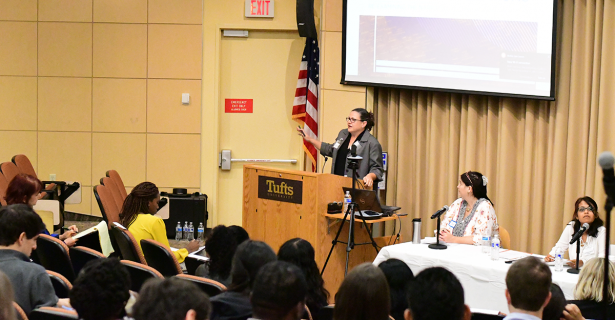From security scholarship to the frontlines of humanitarian aid, there are few limits to the reaches of colonialism’s legacy. Depending on how one has experienced and understood the world around them, this reality can be all too familiar or it can be completely foreign territory.
In 2017, Latifah Azlan (F’19) and Khadija Mohamud (F’19) shared stories over a shared meal, discovering similar frustrations: why are we only hearing some voices in our curricula and how can we build solutions for global challenges when our very conceptions of them are built on antiquated, harmful power structures?
Khadija, Latifah, and a crew of volunteers formed an organizing committee, and the Decolonizing International Relations Conference was born. On October 12, 2018, academics and attendees converged from far and near to unpack the colonial underpinnings of international relations (IR) theory, the damaging implications this has in IR practice, and the processes for decolonizing minds at work.
Dean Ian Johnstone kicked off the event, describing the set of post-Cold War tensions that became apparent during his time working in the United Nations. “There are multiple perspectives on most issues - and at any given time, some of those perspectives dominate - and others get crowded out,” he observed.
Similar themes emerged in a panel discussion dissecting how IR scholarship has not only been affected, but largely defined, by colonial forces. Dr. Sheila Nair (Northern Arizona University) described the Western-centric, highly nationalistic building blocks on mainstream IR which deeply informs her studies of post-colonial feminism. Dr. Julian Go (Boston University) built on this idea, bringing urgency around the need to “reconsider the role of subaltern actors in the global sphere” and center them in IR-related academia. Dr. Jonathan Wyrtzen (Yale University) added that this would not merely be an exercise in historical affirmative action, but rather, a critical step in doing work well and meaningfully in the IR arena.
Participants also had the opportunity to dive deeper into specific topics in intimate sessions with activists, practitioners, and scholars. Dr. Elora Chowdhury (University of Massachusetts, Boston) brought her research on gender and transnational feminism to the forefront of how we understand colonial impacts. Louino Robillard is a Haitian activist and community builder who described the nature of many well-intentioned, but often problematic interventions in Cite Soleil, Haiti. Dr. Pearl Robinson (Tufts University) held a session on navigating archives that looked at the life and work of Dr. Ralph Bunche, a notable American diplomat who was the first African American to win the Nobel Peace Prize, and discussed the various misunderstandings and misconceptions surrounding Dr. Bunche’s intellectual and professional contributions to US diplomacy efforts.
The afternoon sessions began to explore how theory ties into real-world events, decisions, and politics. State security practices inherently reflect values often shaped by imperial, colonial, nationalistic power structures; they tell a state-sanctioned story of who deserves safety and who causes insecurity - and these narratives can lead to exclusionary, often violent outcomes. Dr. Winifred Tate (Colby College) described the militarization of drug policies and the role of paramilitary forces in Colombia’s national security. Dr. Jaskiran Dhillon (The New School) demonstrated the inherent, problematic nature of the concept of a border and the dangerous breadth used by states when defining state security; arguing this has been seen time and time again to suppress the sovereignty and resistance of indigenous peoples in North America. Borders can come in many forms, as Dr. Tazreena Sajjad (American University) noted. Attendees heard - and saw in her graphical visualization - the rapidly rising number of borders in and between states. If you look at it through the lens of decolonizing IR, you have to think about what [walls] are trying to preserve.”
Ambassadors Maria Nzomo (Kenya) and Diego Arria (Venezuela) shared their experiences as practitioners of diplomacy, highlighting how they approached the most difficult apexes of their careers. For Ambassador Nzomo, her diplomacy required an exercise in negotiating space for herself as a female, navigating the exclusionary barriers in her journey. Ambassador Arria gave his perspectives on the slow pace of justice, the ongoing Venezuelan crisis, and his experiences at the UN from the end of the Cold War until the present.
Through his poetic and motivational keynote speech, Dr. Omékongo Dibinga (F’03), a rapper and Professorial Lecturer at American University’s School of International Service, outlined the ways in which one can decolonize their own mind - and subsequently, the world around us. His simple four-step plan revolves around listening, learning, educating, assessing, and acting. He urged participants to apply an inquisitive, critical lens not only to their academics - including curriculums and bibliographies, but also to their personal beliefs, actions, and social circles.
What can students, practitioners, and professors do moving forward? Dr. Kimberly Theidon closed the day, noting that it’s not enough to add the subaltern and stir.” Turn the critical gaze home, and use power to elevate the voices that need to be heard - recognizing the interconnectedness of problems, solutions and people everywhere.

